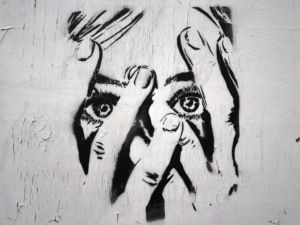News
News in Digest: Trepidation of terror, tech and torn traditions
This article is more than 8 years old.
Living in fear of the unlikely, losing touch with reality

Weary from the screen, wary of all that is seen (photo: JD Hancock)
What do Danes fear most? Is it terror? Well, according to the World Economic Forum, the average European was 4,888 times more likely to die from heart disease than terrorism in 2016, and 218 times more likely to be killed in a car accident.
Fearful on Facebook
Young people are particularly susceptible, according to a study by four upper-secondary school students, which won the research prize Projekt Forskerspirer 2017 for establishing a link between Facebook consumption and the fear of terror.
Their eight-month study established that many young people treat Facebook as their primary source of news, and that ‘local’ comments on global stories tends to bring the threat of terror into their domain.
Concert creeps
Given recent incidents at music venues in Paris, Manchester and Las Vegas, many worry about going to concerts. And with their best interests at heart … DR has given them food for thought.
Its two-part documentary ‘Afsløret – De sorte koncerter’ recently revealed that while concert-goers are thoroughly searched, stagehands roam around freely without any form of security checking.
At big concerts, there are up to 150 stagehands involved, and many are paid in ‘black money’ as well as being unregistered identity-wise. “Nobody has ever stopped me and asked what I have in my bag,” one of them told DR.
Suspect spiking strangers!
When it comes to personal safety, we should be far more worried about having our drink spiked on a night out, as numbers look set to treble this year on 2013, according to data supplied by the poison hotline at two Copenhagen hospitals.
Many incidents go unreported as people, mostly women, write off the experience as one drink too many and an unusually bad hangover.
The more common drug used to spike drinks is GHB, which is easy to access, without taste or odour, works quickly, leads to blackouts and works for a couple of hours.
Concerned by cyberattacks
And again given the odds, perhaps we should be more fearful of a cyberattack. Some 65 percent of the risk strategists asked by Dansk Industri and Beredskabsstyrelsen, the emergency management agency, said it was a constant worry.
Some 63 percent fear an IT crash, and 49 percent are wary of their suppliers failing them. Some 29 percent had experienced a cyberattack over the past two years. A cyberattack on Maersk this year cost the shipper an estimated 1.9 billion kroner.
Cautious of change
Finally, it kind of goes without saying that many Danes fear the erosion of their traditions – a worry typified by the reaction to Gribskolen’s decision that students no longer have to attend a traditional Christmas service held at the local church.
READ MORE: Governors back school over dropped Christmas service
The north Zealand school’s most famous alumnus is Danish PM Lars Løkke Rasmussen, and MPs were quick to condemn the decision as “grotesque”, “completely wrong” and “completely insane”, bemoaning the effect of multiculturalism on Danish traditions.
However, the MPs from parties such as Dansk Folkeparti, Liberal Alliance and Konservative paid less attention to how religion is no longer a compulsory part of the national curriculum.










































